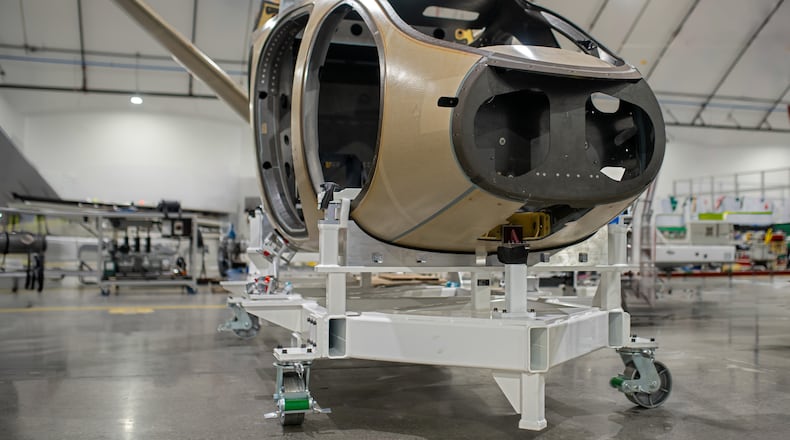But with a cash cushion of $991 million and continued support from Toyota, company leaders nevertheless reiterated that they intend to produce their electric aircraft in Dayton and California, for civilian and military customers.
In an earnings call with industry analysts, JoeBen Bevirt, Joby’s founder and chief executive said more about Joby’s manufacturing plans in Dayton than he has in previous calls.
Bevirt told one analyst that the company is aiming for a “multi-site, scaled (manufacturing) approach.”
“Just today, (I) got a report that we had manufactured 18,000 components in July alone,” he said. “It shows Joby manufacturing globally is hitting its stride.”
“I can’t wait for parts to start coming out of that (Dayton) facility,” he added.
Joby’s craft, sometimes called “flying taxis,” are designed to lift off and land like helicopters and fly forward like planes, quietly and emissions-free.
Joby’s intention is to create a new market — flying passengers to busy urban airports in the U.S., Mideast and Europe, and serving the military — and to provide the service for that market.
“This is a company building a reality that does not exist today,” said Rodrigo Brumana, Joby’s chief financial officer, adding later: “It is not going to be easy.”
“Over time, we expect our Dayton facility will be capable of producing up to 500 aircraft per year,” Joby said in a shareholder letter.
Joby leaders hailed progress in its overall manufacturing efforts, flight testing, commercial partnerships and progress toward certification with the Federal Aviation Administration.
“We’ve taken a concept and turned it into a conforming design,” Bevirt said.
Joby leaders also believe they are well positioned to take advantage of the moment, with the Trump administration encouraging greater manufacturing of drones and an openness to new forms of advanced air mobility.
“With significant advancements on these critical fronts, we are firmly positioned to expand our focus into scaling production capacity to meet growing demand for our aircraft,” the company said in its letter.
Adjusted earnings before interest, taxes, depreciation, and amortization — a key metric for companies — in the quarter was $131.6 million, reflecting employee costs and the costs of developing aircraft.
In May this year, Joby reported net loss of $82.4 million for the first quarter of 2025.
On Wednesday, Joby said it is preparing for final assembly one of its first “conforming aircraft” intended for Type Inspection Authorization (or “TIA”) flight tests. Such tests are used to gauge whether aircraft are airworthy, paving the way to begin commercial passenger work.
“I really want to pound the table on how exciting this moment is,” Joby’s CEO said in the earnings call.
Shares of Joby (NYSE: JOBY) fell 56 cents to $18.93 Wednesday, a 2.8% drop. The stock has a 52-week range of $4.70 to $20.95.
About the Author

